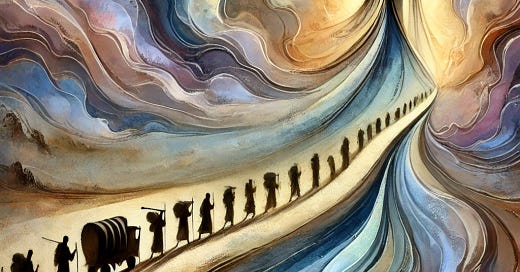Vayechi - Alive and Well in Exile
Galut/Exile is an integral part of our journey that refines our Jewish Identity.
Over the years, and most recently since October 7, Aliyah to Israel has become a topic of thorny debate. Some warn that everyone in exile must make Aliyah because we can never be entirely safe from antisemitism, but another view is that Israel has become so dangerous that it can no longer serve as a safety net.
This is a nuanced issue without a definitive answer, and you might assume that as a rabbi, I would unequivocally promote Aliyah. While there is no doubt that we at Mekor celebrate and admire those who make Aliyah, we also recognize the vital role that Jews play in galut/exile and the significance of galut as an essential part of the Jewish experience.
The very name of this week’s Parsha—Vayechi—offers a profound insight into this issue. It literally means "Yaakov lived," but the Zohar explains that Yaakov did more than merely reside in Egypt; he became alive there, more so than he had in the Land of Israel. Although he journeyed to Egypt solely because of Yosef, he unexpectedly fulfilled his Jewish identity in galut/exile.
The opening section of our Parsha sheds further light on this theme, providing the source of the blessing we give our sons: “Yisimcha Elohim k’Ephraim vk’Menashe”—“May God make you like Ephraim and Menashe.” Some commentators explain that this blessing reminds us of our long history in galut, connecting us to Yosef, who epitomized the experience of an exiled Jew more than anyone else in biblical history. Yosef’s symbol was a calf—an image that also represented Egypt—and his children were born and raised in that foreign land.
Notably, Yosef gave his sons names that resonated deeply with the theme of galut. According to the pasuk, Menashe’s name reflects Yosef’s gratitude to God for helping him “forget his father’s house,” referring to his painful separation from his family in Israel:
כִּֽי־נַשַּׁ֤נִי אֱלֹהִים֙ אֶת־כָּל־עֲמָלִ֔י וְאֵ֖ת כָּל־בֵּ֥ית אָבִֽי
“For God has made me forget all my hardship and all of my father’s house” (Genesis 41:51).
Ephraim’s name, on the other hand, expresses hope and growth amidst galut:
כִּֽי־הִפְרַ֥נִי אֱלֹהִ֖ים בְּאֶ֥רֶץ עָנְיִֽי
For God has made me fruitful in the land of my affliction (Genesis 41:52).
These names capture the dual experience of exile: the struggle to move forward after loss and the ability to thrive and grow even in a foreign and challenging environment.
Thus, our Parsha reveals that exile is not a second-class status. On the contrary, it is the fertile ground for the emergence of a proud and resilient Jewish identity. Exile is not simply a predicament to bemoan; it has served as the setting where we grow into our most authentic Jewish selves.
This perspective is also highlighted in the opening section of our Parsha when Yaakov asks Yosef to bury him in Chevron. According to Rashi, Yaakov prefaces his request by mentioning that he buried Rochel along the side of the road in Efrat/Bethlehem. He expresses regret for not burying her in Chevron, alongside himself and Leah. But if you read the verse, his words hold no hint whatsoever of apology. Then why does Yaakov mention Rochel’s place of burial?
Perhaps we can find the answer in the Midrash which teaches that when the Jewish people are exiled, they will pass by Rochel’s grave on the way, and
רָחֵל מְבַכָּה עַל־בָּנֶיהָ
Rachel [will be] weeping for her children [Jeremiah 31:15]
she will cry for her children who are departing Israel for galut. Indeed,when they return to Israel, it will occur in the merit of Rochel’s tears. From this context, then, it becomes clear that Yaakov is not apologizing; he is acknowledging that Rochel, Yosef, and his children are the forbearers of a transformative idea: galut, or exile, is not merely a punishment but an essential part of our Jewish destiny.
This year, we encountered the unusual situation of Asara B'Tevet falling on a Friday, just as last year. Such an occurrence is infrequent; two consecutive years make it all the more remarkable. Asara B'Tevet itself is unique: we fast to mourn the Babylonian siege of Yerushalayim, an event that occurred 18 months before the destruction of the first Beit Hamikdash by Nebuchadnezzar. Unlike the 17th of Tammuz, which marks the breaching of the walls of Yerushalayim, or Tisha B’Av, which commemorates the Churban Habayit, the destruction of the temple, why do we fast for an event so far removed from the ultimate catastrophe?
Perhaps the answer lies in the significance of its timing. Asara B'Tevet is the only fast day that can fall on a Friday, uniquely bridging the weekday and Shabbat. This detail reflects something profound: Asara B’Tevet is a day that envisions our future. Falling on the cusp of Shabbat, this fast symbolizes a spiritual transition—from chol to kodesh, from the mundane to the holy. It foreshadows the ultimate transition from exile to redemption, from the Diaspora to Israel: May this transformation come speedily in our days.
But until Mashiach comes, we are reminded not to see exile as a misfortune. In the United States, we have learned to engage with secular society in ways that can enrich and deepen our Jewish identity. While exile is worthy of mourning, it also offers opportunities for growth. By leaning into its challenges rather than retreating from them, we can emerge stronger, reminded that even the secular world has the potential to enhance the singular essence of our holy Jewish identity.
Shabbat Shalom.
Rabbi Eliezer Hirsch


